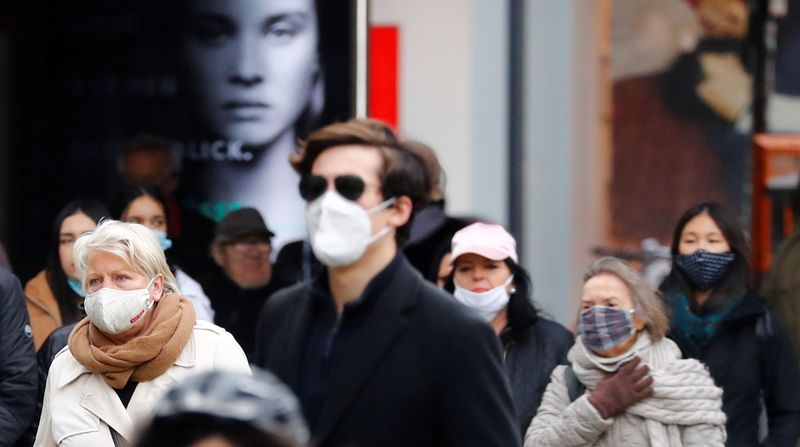By Kirsti Knolle and Inti Landauro
BERLIN/MADRID (Reuters) - Germany warned on Thursday against travel to neighbouring countries, Belgium's foreign minister went into intensive care and Spain said COVID-19 was "out of control" in many areas, as governments across Europe took action to fight the pandemic.
As German authorities reported more than 10,000 daily cases for the first time, Berlin issued travel warnings for Switzerland, Ireland, Poland, most of Austria and many Italian regions, including the capital Rome.
"The situation overall has become very serious," Lothar Wieler, of the Robert Koch Institute, Germany's infectious diseases agency, said in Berlin, adding: "We still have a chance to slow a further spread of the virus."
After Europe appeared to have gained a measure of control over the epidemic following the dramatic lockdowns of March and April, a surge in cases over recent weeks has put the continent back at the heart of the crisis.
Hospitalisations and deaths across most of Europe have not yet reached the levels of the initial wave early this year, but authorities in many countries worry the situation could rapidly get worse.
More than 5.3 million people in Europe have contracted the disease and over 204,000 have died, according to the European Centre for Disease Prevention and Control (ECDC).
India has had more than 7.7 million cases - the world's highest tally after the United States with 8.3 million. But elsewhere in Asia, from China to South Korea or New Zealand, draconian lockdowns and rigorous contact tracing have helped contain the disease.
Grappling with the enormous costs of the coronavirus, Europe's leaders are desperate to avoid a repeat of the blanket lockdowns that shut down their economies in the spring.
But as cases have surged, and health services have come under increasing pressure, they have been forced to impose and expand local restrictions aimed at reducing public gatherings to ever wider areas.
Underlining the reach of the disease, Belgian Foreign Minister Sophie Wilmes went into intensive care on Thursday. German Health Minister Jens Spahn tested positive a day earlier.
"OUT OF CONTROL"
"The second wave is a reality," Spanish Health Minister Salvador Illa said on Thursday. "In many areas of our country, the epidemic is out of control."
A number of Spanish regions are calling for localised curfews such as those implemented in France and Italy, where Lazio, the region around Rome, has joined Lombardy and Campania around Milan and Naples in imposing overnight curfews.
Amid the growing public alarm, Germany's statistics office noted that sales of toilet paper rose almost 90% last week from pre-crisis levels with almost equally sharp jumps in sales of disinfectants and soap.
Only Sweden, a European outlier which has relied largely on voluntary measures to promote social distancing, was an exception, declaring senior citizens no longer need to isolate themselves given lower COVID infection rates than in spring.
As the crisis has intensified, much of the public goodwill seen in the first phase of lockdowns has evaporated and central governments have engaged in angry spats with local authorities from Manchester to Madrid over issues ranging from health and welfare to transport and schools.
With winter coming, health services are looking ahead with apprehension as the wave of COVID patients coincides with the usual seasonal respiratory illnesses.

"We are already swamped," said Bruno Megarbane, head of intensive care at the Lariboisiere hospital in Paris. "So, indeed, there is the fear that we will face a very difficult situation."